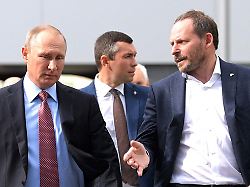“Ineffective mechanism”
Economist calls for a change of course in EU sanctions against oligarchs
February 13, 2024, 10:04 a.m
Listen to article
This audio version was artificially generated. More info | Send feedback
The EU has now passed numerous sanctions packages against Russian citizens. But they are not effective in their current form, complains elite researcher Jakovlev. However, the EU could use other means to drive a wedge between the oligarchs and the Kremlin.
Russia experts are calling for a rethink of the sanctions imposed by the European Union against leading Russian businessmen. After the start of the Russian attack on Ukraine, Brussels implemented the sanctions “hastyly, without a clear understanding of their long-term effects,” criticizes the economist and elite researcher Andrei Yakovlev in the “Spiegel”. Jakovlev was a professor in Moscow until 2022, and he is now conducting research as a scientist at Harvard and at the Hanseatic Economics College in Delmenhorst.
The EU sanctions regime is a “particularly ineffective and unfortunate mechanism”. Many Russian billionaires are hit hard by account closures and entry bans. At the same time, the EU failed to show the oligarchs possible exit options. Clear conditions that, if met, would result in the sanctions being lifted would help drive a wedge between Russia’s economic elite and the Kremlin. So far, the sanctions have had the opposite effect: Because their investments in the West have been frozen, many billionaires are becoming more involved in Russia again.
Because of its status as a nuclear power, Russia could probably never be defeated like Nazi Germany in 1945, said Yakovlev. Europe and the USA therefore needed alternative concepts for political change in Russia. “Elites who are still subject to sanctions today could play a role in this,” says Yakovlev.
Volosh is sanctioned despite his anti-war statement
The debate is triggered, among other things, by the continued sanctioning of the Russian businessman Arkady Volosh. He is the founder of the Russian search engine Yandex. The billionaire condemned the attack on Ukraine last summer as “barbaric” and has been working on selling his Russian business for some time. Kremlin spokesman Dmitry Peskov then described him as a “traitor”. Nevertheless, the EU has extended the sanctions against Yandex founder Volosh.
In this case, the EU is “on very thin ice,” says Gerhard Mangott, a Russia expert at the University of Innsbruck. “It is incomprehensible what Volosh is being accused of.” The Swedish economist and Russia expert Anders Åslund sees it similarly. The justification for the EU sanctions against Wolosh is “poor and dubious”. Brussels is basing its punitive measures against the Yandex founder on, among other things, Åslund’s oligarch book “Russia’s Crony Capitalism”. However, Wolosch appears as a positive example. Åslund therefore sent a letter of protest to the European Council. In it he calls for the sanctions against Wolosh to be lifted.
